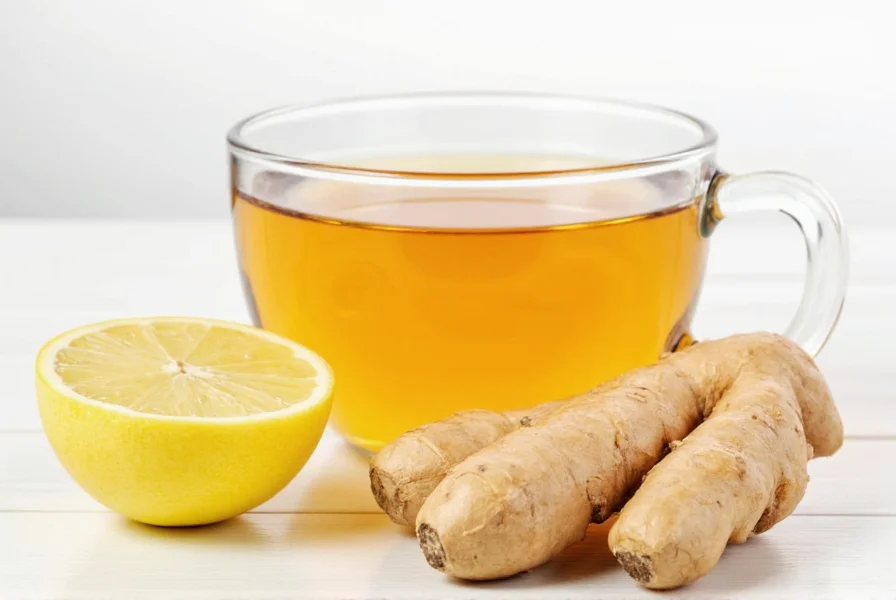When experiencing digestive discomfort, many people turn to natural remedies like ginger tea for relief. This article examines the relationship between ginger tea and diarrhea management based on current scientific understanding, providing practical guidance while acknowledging the limitations of home remedies for gastrointestinal issues.
The Science Behind Ginger and Digestive Health
Ginger (Zingiber officinale) contains bioactive compounds like gingerols and shogaols that have demonstrated anti-inflammatory and antioxidant properties in scientific studies. Research published in the World Journal of Gastroenterology indicates ginger may help regulate gastrointestinal motility, which could potentially benefit those experiencing mild digestive upset.
A 2020 systematic review in Nutrients examined ginger's effects on various digestive conditions, noting its potential to reduce nausea and vomiting—common companions to diarrhea. However, the review emphasized that evidence specifically for diarrhea treatment remains limited compared to its well-documented anti-nausea effects.

How Ginger Tea Might Help with Diarrhea Symptoms
Ginger tea may offer several potential benefits for those experiencing mild diarrhea:
- Nausea reduction - Particularly helpful when diarrhea accompanies stomach flu or foodborne illness
- Mild anti-inflammatory effects - May help soothe irritated digestive tract lining
- Hydration support - Provides fluid replacement while being gentle on the stomach
- Digestive regulation - May help normalize gut motility in some cases
It's crucial to understand that ginger tea addresses symptoms rather than treating the underlying cause of diarrhea. Viral infections, bacterial pathogens, food intolerances, and other medical conditions require appropriate medical diagnosis and treatment.
Preparing Effective Ginger Tea for Digestive Comfort
For maximum potential benefit when experiencing digestive upset, proper preparation matters. Here's how to make therapeutic ginger tea:
- Peel and thinly slice 1-2 inches of fresh ginger root
- Boil slices in 2 cups of water for 15-20 minutes (longer boiling increases potency)
- Strain the liquid into a cup
- Optionally add a small amount of honey (avoid in children under 1 year)
- Drink warm, in small sips, 2-3 times daily as needed
Fresh ginger provides more active compounds than powdered alternatives. Avoid adding dairy, as it may worsen symptoms during digestive distress. For those with sensitive stomachs, start with weaker concentrations and gradually increase as tolerated.
Limitations and When Ginger Tea Isn't Appropriate
While ginger tea may help with mild digestive discomfort, it has important limitations:
| Situation | Recommendation |
|---|---|
| Diarrhea lasting more than 48 hours | Seek medical attention |
| Blood in stool | Consult healthcare provider immediately |
| Signs of dehydration | Use oral rehydration solutions, not just ginger tea |
| Diarrhea in infants or elderly | Consult medical professional before home treatment |
| Diarrhea with high fever | Seek medical evaluation |
Ginger tea should never replace oral rehydration solutions for significant fluid loss. The World Health Organization emphasizes that proper rehydration—not symptom suppression—is the priority in managing diarrhea.
Safety Considerations and Potential Side Effects
While generally safe for most adults, ginger tea may cause:
- Heartburn or gastric irritation in sensitive individuals
- Increased bleeding risk when combined with blood-thinning medications
- Lowered blood sugar levels (caution for diabetics)
- Potential interactions with certain hypertension medications
Pregnant women should consult their healthcare provider before using ginger medicinally, though culinary amounts are generally considered safe. Those with gallstone disease should exercise caution as ginger may increase bile production.

When to Seek Medical Attention for Diarrhea
Natural remedies like ginger tea have their place in managing mild digestive upset, but certain symptoms require professional medical evaluation:
- Diarrhea persisting longer than 48 hours in adults
- Diarrhea lasting more than 24 hours in children
- Signs of dehydration (dark urine, dizziness, extreme thirst)
- Fever above 102°F (39°C)
- Bloody or black stools
- Severe abdominal or rectal pain
For vulnerable populations—including infants, elderly individuals, and those with compromised immune systems—prompt medical consultation is recommended even for seemingly mild symptoms.
Complementary Approaches to Diarrhea Management
While exploring whether can ginger tea help with diarrhea, consider these evidence-based complementary approaches:
- BRAT diet - Bananas, rice, applesauce, and toast provide binding, low-fiber foods
- Probiotics - Certain strains like Lactobacillus rhamnosus GG may shorten diarrhea duration
- Oral rehydration solutions - Specifically formulated to replace lost electrolytes
- Rest - Allowing the digestive system to recover
Remember that natural remedies for diarrhea symptoms work best as part of a comprehensive approach that prioritizes hydration and rest. The effectiveness of how to make ginger tea for diarrhea relief varies by individual and underlying cause.
Conclusion: A Balanced Perspective on Ginger Tea for Digestive Health
Ginger tea represents a time-honored natural approach to digestive comfort with some scientific backing for its anti-nausea properties. While it may provide mild symptomatic relief for some cases of diarrhea, it's not a substitute for medical evaluation when symptoms are severe or persistent.
Those exploring natural remedies for mild diarrhea should use ginger tea as part of a broader strategy that includes proper hydration, appropriate dietary choices, and awareness of when professional medical care becomes necessary. Understanding the limitations of home treatments like ginger tea for digestive issues ensures safer self-care practices while recognizing when expert intervention is needed.











 浙公网安备
33010002000092号
浙公网安备
33010002000092号 浙B2-20120091-4
浙B2-20120091-4